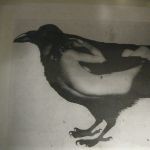Recent Forum Topics › Forums › The Public House › Harpers: What came before the big bang?
- This topic has 0 replies, 1 voice, and was last updated 7 years ago by
 wv.
wv.
-
AuthorPosts
-
May 1, 2017 at 8:45 am #68219
 wvParticipant
wvParticipantlink:http://harpers.org/archive/2016/01/what-came-before-the-big-bang/
What Came Before the Big Bang?
The physics and metaphysics of the creation of the universeBy Alan Lightman
On Wednesday, February 11, 1931, Albert Einstein met for more than an hour with a small group of American scientists in the cozy library of the Mount Wilson Observatory, near Pasadena, California. The subject was cosmology, and Einstein was poised to make one of the more momentous statements in the history of science.With his theories of relativity and gravity long confirmed and his Nobel Prize ten years old, he was by far the most famous scientist in the world. “Photographers lunged at me like hungry wolves,” he had written in his diary when his ship landed in New York two months earlier.
Photographs by Thomas AllenPhotographs by Thomas Allen
For years Einstein had insisted, like Aristotle and Newton before him, that the universe was a magnificent and immortal cathedral, fixed for all eternity. In this picture, time runs from the infinite past to the infinite future, and little changes in between. When a prominent Belgian scientist proposed in 1927 that the universe was growing like an expanding balloon, Einstein pronounced the idea “abominable.”
By 1931, however, the great physicist had been confronted with telescopic evidence that distant galaxies were in flight. Perhaps even more convincing, his mathematical model for a static universe had been shown to be like a pencil balanced on its point: give it a tiny nudge and it starts to move. When he arrived in Pasadena, Einstein was ready to acknowledge a cosmos in flux. He told the men gathered in the library in their suits and ties that the observed motion of the galaxies “has smashed my old construction like a hammerblow.” Then he swung down his hand to emphasize the point.
What arose from the shards of that hammerblow was the cosmology of the Big Bang: the idea that the universe is not static and everlasting — that it “began” some 14 billion years ago in a state of extremely high density and has been expanding and thinning out ever since. According to current data, our universe will keep expanding forever.
Sean Carroll, a professor of physics at the California Institute of Technology, is a Big Bang cosmologist. He is also one of a small platoon of physicists who call themselves quantum cosmologists. He wants to know what happened at the very first moment of the Big Bang, whether time or anything else existed before it, and how we can tell the future from the past. Such bedrock questions in physics, which have been seriously posed only recently, might be likened to Descartes asking for proof of his existence.
Quantum cosmology is speculative work, but Carroll explained its allure: “It’s high risk, high gain.” We do not yet possess a full theory of gravity, space, and time in the quantum era. Nevertheless, some of the sharpest minds in physics, including Stephen Hawking, Andrei Linde, and Alexander Vilenkin, have pondered the subject. It is a tiny field, not for the timid. The first difficulty is that the birth of our universe was a one-performance event, and we weren’t there in the audience. An understanding of the very beginning of the universe also requires an understanding of so-called quantum gravity: gravity at enormously high densities of matter and energy, which are impossible to replicate. Most physicists believe that in this quantum era, the entire observable universe was roughly a million billion billion times smaller than a single atom. The temperature was nearly a million billion billion billion degrees. Time and space churned like boiling water. Of course, such things are unimaginable. But theoretical physicists try to imagine them in mathematical form, with pencil and paper. Somehow, time as we know it emerged in that fantastically dense nugget. Or perhaps time already existed, and what emerged was the “arrow” of time, pointing toward the future.
Physicists hope that within the next fifty years or so, string theory or other new theoretical work will provide a good understanding of quantum gravity, including an explanation of how the universe began. Until then, the quantum cosmologists will de- bate their hypotheses, each backed up with pages of calculations…see link
-
AuthorPosts
- You must be logged in to reply to this topic.

